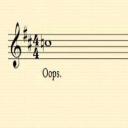Yahoo Answers is shutting down on 4 May 2021 (Eastern Time) and the Yahoo Answers website is now in read-only mode. There will be no changes to other Yahoo properties or services, or your Yahoo account. You can find more information about the Yahoo Answers shutdown and how to download your data on this help page.
What do people think of positive discrimination?
The link below gives information about a new fund available in the UK to help promote the work of woman musicians. For me this is patronising in the extreme. It is akin to patting women on the head and saying "There, there - we know you're not as good as men and can't compete on a level playing field. Therefore, we're going to make some special allowances for you and make it easier for you to get noticed away from the influence of and competition from all those nasty, superior men."
I have the same objections to ANY form of positive discrimination because of gender, religion, sexual orientation (why there have to be any gay orchestras or choirs is beyond me!) or other possible 'ghettoisation' the 'PC' brigade might decide to inflict on people.
I was once asked in a professional capacity why there weren't more works by women composers played at the Proms (the world's largest music festival, promoted by the BBC and held over two months every summer in London (http://www.bbc.co.uk/proms/2010/)). My initial answer was very simple: "Because there are a lot fewer women composers than men - especially if one looks back in history." The answer came back "But don't you think we should be setting-aside a percentage of performance time in concerts for women composers?" My reply: "Even if that percentage is completely misrepresentational? Even if the music isn't very good in some cases? Isn't that a but patronising? Where do we stop? Should we have quotas for gay composers? For Jewish ones? For Muslim ones? For disabled composers as well?" "Of course not", they said "Then why do women need special help just because they are female? Femininity is neither an illness nor a disability, is it?"
My very non-PC answer (regulars here will know I have no truck whatsoever with 'PC') rendered my colleague into bemused silence.
I know that in many walks of life and in some professions, men are still dominant. Sometimes this is because of the perpetuation of discrimination. Sometimes it is simply because a job/task might be unsuitable for most women (let's not kid ourselves - men and women ARE different - that's why the human species is still here).
In music, there is very little discrimination. Outside the world of conducting (where I admit women still have to prove them selves to some), women are doing very well in music and surely need no patronising effotrs at all.
So why do we need special pockets of money put aside for women? I would, of course, be particularly interested to get the view of women contributors here.
MT: I can't argue with what you say. Quotas are appalling for the same reasons as I have already expressed in my question. Artificial quotas according to race, gender, etc means that, in almost all cases, standards are compromised. They HAVE to be if we are not allowed simply to appoint the BEST PEOPLE FOR THE JOB. The worst thing is that nearly everything person recognises this, yet doesn't rail against 'PC'.
And, of course, separation in sport is essential ("let's not kid ourselves - men and women ARE different").
Petr: Call it what you will: "favouritism", "positive discrimination" (I'm not usually one to adopt 'management' speak', but the phrase 'positive discrimination' does seem to do the job quite well, although I see what you mean), it's all the same nasty stuff dressed in slightly different ways.
I'd still like to see more female perspectives on this.
Wayne: 'being in the right place at the right time' and 'it's not what you know, but WHO you know' always have been, remain, and always will be, I suspect, constants in our world. These truths don't seem to discriminate unduly.
suhwahaksaeng: You have brought-up an interesting point that white, 'westerners' don't have the monopoly on rascism and prejudice (although some would try to have us believe that WAS the case).
Actually, 'reverse discrimination' is a better term, as there's nothing 'positive' about it in my opinion. Oy vey - I have just favoured an American term over a Brit one. Whatever next?
Malcolm: The bulk of the PRS Foundation for Music's money is generated through revenue from collecting rights returns for composers, publishers and performers. It is an independent body, true enough, but a very influential one in the UK - particularly in the world of promoting and supporting music by living British composers. This I applaud (as you won't be surprised to learn). I have to question the wisdom of this fund and have drafted a letter to the PRSF asking when we can expect the announcement of the 'Men Make Music' initiative.
drakolan: Your post reminds me of a time when there was a 'European Women's Orchestra' based in London, comprising only female musicians (completely pointless in London where more than half of the best, most successful freelance musicians are female!) and only playing the work of 'women composers'. I pointed-out to the director of this orchestra that women musicians didn't need this gesture (in fact, many female musicians didn't WANT to play in it) and, that by marginalising the music of of women composers in this way, all one would do would be to play to the same small 'ghetto' of women listeners time after time; it would do no service whatsoever to the cause of bringing the work of female composers to a wider public. Within a month the director had disbanded the orchestra.
8 Answers
- 1 decade agoFavourite answer
And yet the special interest group receiving the money, rushes to take it, either not noticing or not caring about the implied insult.
Your question is larger than the field of music, much larger, and is one of the problems undermining every aspect of Western culture as it stands.
We don't see collections that are titled 'The Great Poems of Straight White Men', do we? Is it because people that aren't in an 'underrepresented' group aren't as creative? Does their art means less? Is it of lower quality?
Of course not, and to think so is the height of inanity. That we feel the need to 'correct an imbalance' goes back to a single fact: money. They're hoping that somehow, they will interest new people in whatever they're creating or doing and will turn a profit from their endeavor.
I'll add further on this in a different light. I have had the pleasure of sitting in master classes with two of the more prominent female composers of our time: Joan Tower and Jennifer Higdon.
Before I begin, Joan Tower is an excellent critic, and the comments she made about the work I presented are things that still have an effect on how I compose today. If you have never been to a master class, I will just say that it is very rare to receive much of anything of true, lasting value in a short 15 to 30 minute review of a piece. However, I find that she seems to be very angry with men as a whole, and feels slighted that men are the prominent gender in musical history. Her music itself, in turn, seems to be 'in drag'. It SOUNDS like a woman that is trying to be masculine, even in her celebrated works Fanfares for the Uncommon Woman. Her anger has turned her to reducing the feminine voice, and I think is an overall detriment to her body of work.
Jennifer Higdon, on the other hand, embraces it. She -is- a woman and her music profoundly proclaims it, to great effect. I did not have a piece critiqued by her, and it is hard to judge what she says about others' work, at least in terms of aesthetic because I can't really say exactly what they thinking when they composed it.
- Anonymous1 decade ago
Yet another example of the selfish, bastard child of previously noble feminism ideals: "neo-feminism". They've learned that they can just step over people, demand whatever they want and get it. In this case they just want equal attention in a particular field. Women should be encouraged into any field just as well as any man but if they don't make the cut then that's too bad.
It's the same case with the police and their gender and race quotas. The reason the tall, well-toned caucasians have been preferred is because they are better at enforcing the law, there are exceptions but this is how things are.
Sports are a reasonable exception. We watch sports for the competitiveness. The speed of the winner is less important than his victory against others. Would the quickest sprinter in the world running a one-man race make for good entertainment? Women competing in separate events uses the same rationale as having weight classes in boxing.
In life, it is not a competition in the same sense as sport, it is just used as a testing method, such as in a job interview, where the winner is chosen because he has more to offer the employer. In other words, it is simply a means to a different end instead of being an end in itself.
All these special rights that only exist for women are the result of the current zeitgeist we live under.
- 1 decade ago
I think the question you have to ask is "Will this program make anything worse?" and I think clearly that answer is no. Woman are clearly underrepresented in composition and offering grant money for a commission that might not have happened otherwise is always good, no matter who the grant is offered to. At least someone's getting money in the arts.
You're actually being more PC than you think. What you're saying is that it's unfair to single out one ethnic/religious/gender/etc. group for a benefit because the rest should have that same opportunity. We're all equal right? And that's what you're alleging, that woman have equal abilities as men in the arts, or rather, specifically in music.
Which is clearly not true. You point it out yourself: women have yet to prove themselves in conducting. Why is that? I suppose that's tough to answer, but my guess is because people don't take female conductors seriously. They don't, very generally speaking, have the same musical and physical authority on the podium as men. Why would people take female composers any more seriously? It's probably something psychological, both from the male listener's perspective and the female composer's perspective. But I don't know enough about that to make any claims.
The playing field isn't level, not by any stretch of the imagination.
- Malcolm DLv 71 decade ago
I think it depends to some degree on who is doing the "promotion." If this is an organization of women attempting to promote their cause... I don't see a problem with it. It is a private charity and is self funded so I guess you have a choice to endorse and support it or not. I think I'd have more of a problem with it if it were publically funded. Here is the United States, quotas are a fact of life... here it is called Affirmative Action. The U.S. is a multicultural society and this has been an accepted by product of the legislature... but it is slowly declining.
I think promotion in all things should be based on merit. It is however a fact that the vast majority of classical music was created at a time when women did even have the vote... so any retrospective of the genre is bound to appear "male - centric."
Bottom line... if you are in the mode to donate to a cause (and in this case the cause is Women in Music), then you have the right to hand over your cash to which ever cause suits your fancy.
- 1 decade ago
"(...)patronising in the extreme. It is akin to patting women on the head and saying "There, there - we know you're not as good as men and can't compete on a level playing field. Therefore, we're going to make some special allowances for you and make it easier for you to get noticed away from the influence of and competition from all those nasty, superior men.""
You took the words right out of my mouth.
True equality won't have been achieved until there's none of this nonsense.
No special funds for female composers.
No festivals of women's music.
No requirement for companies to hire a certain percentage of females.
No "investing in girls" and ignoring boys. The last thing I heard, boys were falling behind academically.
People should be judged on their merits, not what they happen to have in their pants.
- suhwahaksaengLv 71 decade ago
I think there are other people who agree with you.
Some people have wondered why Amy Beach and Helen Hopekirk are called women composers if Mozart and Beethoven aren't called men composers.
Some people have wondered why Nathaniel Dett and Samuel Coleridge-Taylor are called black composers if Mozart and Beethoven aren't called white composers.
Where I live, I'm in a discriminated minority.
I'm not expected to know any Korean because they think all Westerners are imbeciles.
If I so much as breathe three words in Korean, they open up their eyes in astonishment and exclaim,
"Oh! You speak Korean so beautifully!"
That's supposed to neutralize the damage from thinking we're all imbeciles, but it doesn't.
PS In the United States, it's called "reverse discrimination."
- 1 decade ago
generally i think it's rubbish, particularly for a group like women who don't even have much trouble any more (at least in the western world)
i still resent winning "best girl in science" in high school, particularly given i also won "best student in science"... maybe they really needed a "best boy in science" award?
in some rare cases it's constructive, where some kind of constructive assistance is given, like wage subsidies for employing people with a disability, or grants to make workplaces suitable for people with disabilities. Given most workplaces already have a women's bathroom, and even a parents room, i think women could do without being patronized.
- Anonymous5 years ago
Interesting notion. Did Gordon Brown hire Harriet Harman as the Minister for Equality because she was the best person for the job or, because he just needed a woman, and she wasn't doing anything else at the time? Under Harman's proposed legislation, it would mean that Brown was just filling his 'positive' quota requirement. Maybe the quota applied to the Minister for Housing too?





